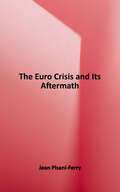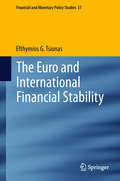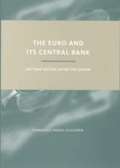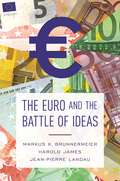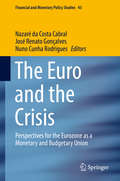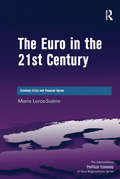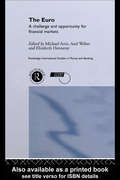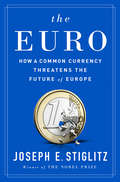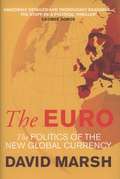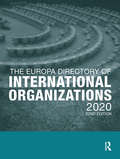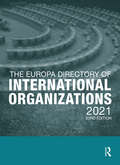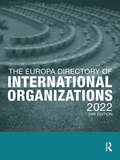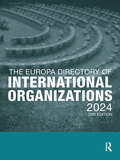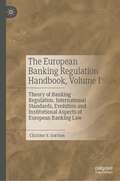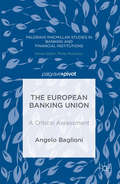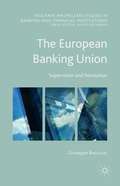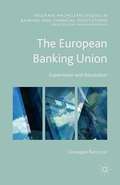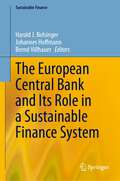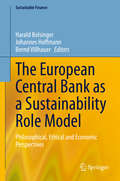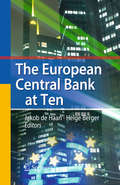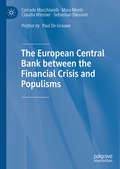- Table View
- List View
The Euro Crisis and Its Aftermath
by Jean Pisani-FerryThe euro's life, while only slightly more than a decade long, has been riddled by a series of challenges and crises. The eruption of the Greek crisis in 2010 took European policymakers by surprise and forced them to design responses to a quickly deteriorating situation. Even though Europe has final begun to stabilize, the disparity between the prosperous Northern countries, especially Germany, and the plummeting Southern countries, including Spain and Greece, has exacerbated economic and political problems within the Eurozone. Amidst loud and frequent debates, solutions have been enacted, but the struggles facing this monetary union continue to develop even today. <p><p> The Euro Crisis and Its Aftermath was written to inform readers about the roots of this enduring European crisis and the alternative proposals for ending it. In four parts, Jean Pisani-Ferry explains the origins of the European currency, the build-up of imbalances and oversights that led to the crisis, the choices European policymakers have both addressed and ignored since 2010, and the evolution of the policy agenda and possible options for the future. The book is as much of an informative and analytical history as it is a discussion of solutions for a more prosperous European economy. <p><p> Rather than putting forth and supporting a thesis, Pisani-Ferry helps readers understand the past and present of the euro crisis and form their own opinions about potential solutions. This book is not intended to reach only economists, as time has long passed since European monetary unification was a debate limited to academics. This book is also for the policy makers searching for solutions, citizens of Europe enduring the consequences, and the international community that has felt the effects of an unstable Eurozone.
The Euro Experiment
by Paul WallaceHow and why did the euro crisis happen? What are the implications for the economic and political future of Europe? The euro is an extraordinary political and economic experiment, the results of which are still highly uncertain. This book, written by a leading commentator on the economics of the European Union, provides a clear and analytical guide to the euro experiment and the subsequent crisis. Written in a balanced way that is neither pro-euro nor euro-sceptic, it explains the political forces that helped to create and maintain the single currency. Further, it argues that the recent crisis can be best understood in terms of six fundamental issues: sovereign debt, banking, private debt, macroeconomic imbalances, defective economic governance, and the interplay of national and European politics. This accessible account will appeal to a wide readership, including general readers and students as well academics and policymakers working in banking and public policy.
The Euro and International Financial Stability
by Efthymios G. TsionasAs a result of the financial crisis, the weaknesses of the Eurozone, including the public debt crisis, materialized in severe depressions in certain of its country members. In this monograph, the author analyzes structural weaknesses of the Eurozone and argues that they can be traced to (i) institutional differences, (ii) differences in the economic structures, (iii) the fundamental inability of European Bureaucracy to deal with crises, and (iv) the extreme rigidity of markets which prevents a general equilibrium in product and credit markets. He concludes that whether the Eurozone is sustainable, depends on future monetary and credit policies, and discusses the implications of reforming it in the best interest of the international banking and financial system. The recent policies of the ECB of "cheap" credit expansion are examined in detail. The approach of the work is along the lines of von Mises' and Hayek's Austrian tradition; additionally, substantive international empirical evidence supporting this Austrian approach is presented.
The Euro and Its Central Bank: Getting United after the Union
by Tommaso Padoa-SchioppaThis history and analysis of the euro and the European Central Bank traces the process of European monetary integration from its beginnings as a Utopian vision in the aftermath of World War II through the establishment of a single currency managed by a central bank.
The Euro and the Battle of Ideas
by Harold James Markus K. Brunnermeier Jean-Pierre LandauHow philosophical differences between Eurozone nations led to the Euro crisis—and where to go from hereWhy is Europe's great monetary endeavor, the Euro, in trouble? A string of economic difficulties in Greece, Ireland, Spain, Italy, and other Eurozone nations has left observers wondering whether the currency union can survive. In this book, Markus Brunnermeier, Harold James, and Jean-Pierre Landau argue that the core problem with the Euro lies in the philosophical differences between the founding countries of the Eurozone, particularly Germany and France. But the authors also show how these seemingly incompatible differences can be reconciled to ensure Europe’s survival.As the authors demonstrate, Germany, a federal state with strong regional governments, saw the Maastricht Treaty, the framework for the Euro, as a set of rules. France, on the other hand, with a more centralized system of government, saw the framework as flexible, to be overseen by governments. The authors discuss how the troubles faced by the Euro have led its member states to focus on national, as opposed to collective, responses, a reaction explained by the resurgence of the battle of economic ideas: rules vs. discretion, liability vs. solidarity, solvency vs. liquidity, austerity vs. stimulus.Weaving together economic analysis and historical reflection, The Euro and the Battle of Ideas provides a forensic investigation and a road map for Europe’s future.
The Euro and the Crisis
by Nazaré da Costa Cabral José Renato Gonçalves Nuno Cunha RodriguesThis book analyzes the effects of the recent crisis and evaluates potential solutions to the gridlock that is currently dominating the Eurozone and the European Union, concerning both the monetary policy and the budgetary and fiscal policy. The timely study highlights the main challenges that European political leaders will face in the months to come. Furthermore, its interdisciplinary approach embraces economic, financial and legal perspectives, so as to ensure the global coherence and comprehensiveness of its content. The contributors to this volume are prominent experts from the areas of Economics, Finance, Law, and Political Science, offering readers a multifaceted view of the topics discussed.
The Euro in Crisis: Decision Time at the European Central Bank
by Gunnar Trumbull Dante Roscini Diane ChoiThis case traces the origins and evolution of the European Central Bank, with attention to its 2010 decision concerning the purchase of Greek sovereign debt.
The Euro in Crisis: Decision Time at the European Central Bank
by Gunnar Trumbull Dante Roscini Diane ChoiThis case traces the origins and evolution of the European Central Bank, with attention to its 2010 decision concerning the purchase of Greek sovereign debt.
The Euro in the 21st Century: Economic Crisis and Financial Uproar (The International Political Economy of New Regionalisms Series)
by Maria Lorca-SusinoThe Euro in the 21st Century clarifies the perception of the euro and empirically demonstrates that the euro has become a true common currency and the Eurozone a true optimal currency area, presenting, in turn, a model to imitate. In order to demonstrate this, this study analyzes the economic and monetary requirements and policies required to introduce a common currency as well as the theoretical underpinnings of both the European integration process and the historical economic, monetary, political, and social circumstances that favoured the creation of the economic and monetary union. Furthermore, this book sheds light on how the current economic and monetary circumstances are affecting the euro project through and analysis of three intertwined issues. It studies how the economic chaos and financial uproar, which has plagued the Eurozone and world economy since 2008, has affected the single-currency regime as well as the current image of the euro worldwide. Moreover it summarizes the lesson to be learnt from what can be considered 'the first euro crisis'. Finally, it thoroughly analyzes the behaviour of the US Federal Reserve, the European Central Bank, and the International Monetary Fund during this crisis. This book draws on and contributes to several bodies of literature within Political Economy, Economics, and International Relations and is particularly relevant at this time given that the current unfolding economic imbalances are causing some Eurozone Member States to rethink their economic and political views concerning the euro.
The Euro: A Challenge and Opportunity for Financial Markets (Routledge International Studies in Money and Banking #Vol. 10)
by Elizabeth Hennessy Michael Artis Axel WeberIn this book leading financial professionals and academics examine the prospects for the European single currency. The impact of the Euro is assessed in terms of risks and opportunities for financial intermediaries, challenges for monetary and supervisory authorities and issues for portfolio management and corporate finance.
The Euro: How a Common Currency Threatens the Future of Europe
by Joseph E. StiglitzCan Europe prosper without the euro? In 2010, the 2008 global financial crisis morphed into the “eurocrisis.” It has not abated. The 19 countries of Europe that share the euro currency—the eurozone—have been rocked by economic stagnation and debt crises. Some countries have been in depression for years while the governing powers of the eurozone have careened from emergency to emergency, most notably in Greece. In The Euro, Nobel Prize–winning economist and best-selling author Joseph E. Stiglitz dismantles the prevailing consensus around what ails Europe, demolishing the champions of austerity while offering a series of plans that can rescue the continent—and the world—from further devastation. Hailed by its architects as a lever that would bring Europe together and promote prosperity, the euro has done the opposite. As Stiglitz persuasively argues, the crises revealed the shortcomings of the euro. Europe’s stagnation and bleak outlook are a direct result of the fundamental challenges in having a diverse group of countries share a common currency—the euro was flawed at birth, with economic integration outpacing political integration. Stiglitz shows how the current structure promotes divergence rather than convergence. The question then is: Can the euro be saved? After laying bare the European Central Bank’s misguided inflation-only mandate and explaining how eurozone policies, especially toward the crisis countries, have further exposed the zone’s flawed design, Stiglitz outlines three possible ways forward: fundamental reforms in the structure of the eurozone and the policies imposed on the member countries; a well-managed end to the single-currency euro experiment; or a bold, new system dubbed the “flexible euro.” With its lessons for globalization in a world economy ever more deeply connected, The Euro is urgent and essential reading.
The Euro: The Politics of the New Global Currency
by David MarshThis book is the first comprehensive political and economic account of the birth and development of the Euro. Today the Euro is the supranational currency for sixteen European countries and the world's second-largest reserve currency. David Marsh tells the story of the rivalries, intrigues, and deal making that brought about a currency for Europe, and he analyzes the achievements and shortcomings of its first decade of existence. While the Euro represents a remarkable triumph of political will, great pressures are building on the single currency. Drawing on more than 100 interviews with leading figures associated with the Euro, and scores of secret documents from international archives, Marsh underscores the Euro's importance for the global economy, in particular for U. S. and British economic and political agendas. Hidden facts and fresh insights from The Euro: --How the legacy of France and Germany's tortuous relations affects the Euro --Why the United Kingdom is unlikely to accept the Euro before 2025 --The impact on the Euro of the U.S. credit crisis --How the Euro has rebounded against the aspirations of its founders --How Italy and Spain have massively lost competitiveness --Why radical changes must be adopted to prevent a European upheaval.
The Europa Directory of International Organizations 2020
by Europa PublicationsThe Europa Directory of International Organizations 2020 serves as an unequalled one-volume guide to the contemporary international system. Within a clear, unique framework the recent activities of all major international organizations are described in detail. Given alongside extensive background information the reader is able to assess the role and evolving functions of these organizations in today's world. The contact details, key personnel and activities of more than 2,000 international and regional entities have again been thoroughly researched and updated for this 20th edition. Highlights in this edition include: - a fully revised Who's Who section with biographical details of the key players in the international system. - the response of the international community to crises and conflicts throughout the world. - introductory essays, written and updated by experts in their field, which consider topics including global environmental governance, the international criminal justice system, international humanitarian co-operation, and governance of the global economy.
The Europa Directory of International Organizations 2021
by Helen CantonThe Europa Directory of International Organizations 2021 serves as an unequalled one-volume guide to the contemporary international system. Within a clear, unique framework the recent activities of all major international organizations are described in detail. Given alongside extensive background information the reader is able to assess the role and evolving functions of these organizations in today's world. The contact details, key personnel and activities of more than 2,000 international and regional entities have again been thoroughly researched and updated for this 23rd edition. Highlights in this edition include: - a fully revised Who's Who section with biographical details of the key players in the international system. - the response of the international community to crises and conflicts throughout the world. - specially-commissioned introductory essays cover topics including global environmental governance, transboundary water management, and multilateral governance and global action on health.
The Europa Directory of International Organizations 2022
by Helen CantonThe Europa Directory of International Organizations 2022 serves as an unequalled one-volume guide to the contemporary international system. Within a clear, unique framework the recent activities of all major international organizations are described in detail. Given alongside extensive background information the reader is able to assess the role and evolving functions of these organizations in today's world. The contact details, key personnel and activities of more than 2,000 international and regional entities have again been thoroughly researched and updated for this 24th edition. Highlights in this edition include: - a fully revised Who's Who section with biographical details of the key players in the international system. - the response of the international community to crises and conflicts throughout the world. - specially-commissioned introductory essays cover topics including global environmental governance, transboundary water management, and multilateral governance and global action on health.
The Europa Directory of International Organizations 2024 (The Europa Directory of International Organizations)
The Europa Directory of International Organizations 2024 serves as an unequalled one-volume guide to the contemporary international system.Within a clear, unique framework the recent activities of all major international organizations are described in detail. Given alongside extensive background information the reader is able to assess the role and evolving functions of these organizations in today's world.The contact details, key personnel and activities of more than 2,000 international and regional entities have again been thoroughly researched and updated for this 25th edition.Highlights in this edition include:- a fully revised Who's Who section with biographical details of the key players in the international system.- the response of the international community to crises and conflicts throughout the world.- specially-commissioned introductory essays cover topics including global environmental governance, transboundary water management, and multilateral governance and global action on health.
The European Account Preservation Order Regulation: A Commentary
by Gilles Cuniberti Sara MiglioriniThe European Account Preservation Order (EAPO) Regulation provides a protective measure for creditors wishing to freeze the bank account of their debtor, preventing the transferral or withdrawal of funds. Courts can issue freezing measures over bank accounts located in other member states, thereby establishing a new remedy for cross-border debt recovery in Europe. <P><P>This book provides a detailed article-by-article commentary of the EAPO Regulation. It describes its legislative history and structure and carries out a critical analysis of its provisions and recitals, focusing on the practical implementation of the instrument. The commentary also provides additional focus on the interplay between the EAPO Regulation and the existing EU instruments and framework, and examines specific issues that the implementation of the Regulation might raise in member states. This is an important resource tool for practitioners, legal scholars and students interested in the theoretical and practical implications of the EAPO Regulation.<P> The unique article-by-article commentary ensures that none of the provisions of the Regulation are neglected and that all interpretative issues are addressed.<P> Incorporates the views and analysis of scholars of numerous member states including Germany, France, Spain and Italy.<P> Offers an in-depth analysis of two crucial issues which were not clearly addressed by the Regulation: its territorial scope and the exclusion of arbitration.
The European Banking Regulation Handbook, Volume I: Theory of Banking Regulation, International Standards, Evolution and Institutional Aspects of European Banking Law
by Christos V. GortsosIn two volumes, this book covers in a comprehensive, internally balanced, systematic and detailed way the field of European Union (EU) banking law and regulation. In three parts, Volume I offers a brief introduction to the role of banks in the contemporary financial system and the theory of banking regulation, a thorough analysis of international financial standards which are contained in the sources of public international banking law (and of public international financial law, in general), a detailed presentation of the gradual evolution and the sources of EU banking law, as well as a precise analysis of the law-making process and the key institutional aspects of this branch of EU economic law. The standards and rules adopted and the institutions created in the aftermath of the (2007-2009) global financial crisis and the subsequent euro area fiscal crisis, as well as during the current pandemic crisis are discussed, as appropriate. A detailed analysis of the substantive aspects of EU banking law will follow in Volume II
The European Banking Union
by Angelo BaglioniWhy did European policy-makers introduce the Banking Union? Which are its main features? How does it affect banks and their customers? This book tries to answer these questions, by providing a clear description of the building blocks of the banking union, and by discussing the issues that still remain unanswered.
The European Banking Union: Supervision And Resolution (Palgrave Macmillan Studies in Banking and Financial Institutions)
by Giuseppe BoccuzziThe 2008 financial crisis all but brought down the financial system and real economies of industrial countries. The Banking Union took a broad approach to resolve the structural fragmentation and distortions in the European banking system which were major obstacles to a working single market for financial services. This book examines the numerous changes happening to European legislations for the prevention and management of banking crises. What emerges is a changing picture of regulations and institutions, of goals, tools and opinions, public and private, European and national all involved in the task. The book focuses on the new framework for banking crisis management, starting from the foundations of banking regulation and supervision. It explores the institutional architecture of banking supervision and crisis management, the powers of the authorities, the tools for administrative actions, the complexities of business and bankruptcy laws, individual rights and their legal guarantees.
The European Banking Union: Supervision and Resolution (Palgrave Macmillan Studies in Banking and Financial Institutions)
by Giuseppe BoccuzziThe 2008 financial crisis all but brought down the financial system and real economies of industrial countries. The Banking Union took a broad approach to resolve the structural fragmentation and distortions in the European banking system which were major obstacles to a working single market for financial services. This book examines the numerous changes happening to European legislations for the prevention and management of banking crises. What emerges is a changing picture of regulations and institutions, of goals, tools and opinions, public and private, European and national all involved in the task. The book focuses on the new framework for banking crisis management, starting from the foundations of banking regulation and supervision. It explores the institutional architecture of banking supervision and crisis management, the powers of the authorities, the tools for administrative actions, the complexities of business and bankruptcy laws, individual rights and their legal guarantees.
The European Central Bank and Its Role in a Sustainable Finance System (Sustainable Finance)
by Johannes Hoffmann Bernd Villhauer Harald J. BolsingerThis book analyses the new strategic decisions of the European Central Bank. Contributors from different fields examine especially the sustainability strategy of the ECB: What role can the European Central Bank play in fighting climate change? ECB President Christine Lagarde has repeatedly confirmed that the central bank wants to play a role in coping with climate change. What will this role be? What instruments does the ECB have to make a difference in challenges such as the defossilization of the economy and transport, biodiversity, the energy transition, resource consumption and other sustainability areas? Is it entitled or obliged to go beyond the classic mandate of maintaining price stability? The volume includes contributions from academics and practitioners from the financial sector, civil society and institutions involved at European level.
The European Central Bank as a Sustainability Role Model: Philosophical, Ethical and Economic Perspectives (Sustainable Finance)
by Harald Bolsinger Johannes Hoffmann Bernd VillhauerThis book examines selected actions and investments of the European Central Bank (ECB) from a climate and sustainability standpoint. Shedding new light on the topic from various angles – ethical, philosophical, political, economical and legal – it situates sustainability mainstreaming in the finance and investment field at all levels. The former ECB President Mario Draghi once said that he considered sustainable development and an intact environment to be human rights, and therefore enshrined in the EU Charter of Fundamental Rights. The acting ECB President Christine Lagarde added that the future path for the climate is uncertain, but it would remain within our power to influence it. However, with all that in mind the ECB’s policy of buying assets as securities is often questionable. This volume analyzes these actions in connection with sustainability, and puts forward practical recommendations for improving the ECB’s investment strategy on its way creating a sustainable financial market.
The European Central Bank at Ten
by Helge Berger Jakob De HaanComing at a critical juncture for the euro, the book takes stock of the ECB's experience during its first ten years and discusses the way ahead. The articles are written by well-known experts in the field and provide the reader with a comprehensive overview of relevant policy issues, including the ECB's communication and its monetary strategy and instruments.
The European Central Bank between the Financial Crisis and Populisms
by Corrado Macchiarelli Claudia Wiesner Mara Monti Sebastian DiessnerIn light of the handover from the European Central Bank President Mario Draghi to Christine Lagarde in November 2019, this book provides an in-depth analysis of the events which unfolded since the euro area sovereign debt crisis in 2010 up until today. The book focuses on the far-reaching implications of the last decade, shedding light on a wide spectrum of political, economic and financial aspects of the European poly-crises and how monetary policy reacted to these challenges. The book places particular emphasis on the tensions that the supranational central bank was subject to during this period, and on their outcomes in terms of the policies, their legitimacy, and their public reception. As such, this book will be relevant not only to understand the political implications of the past crisis but also, and foremost, in understanding "what is next".
